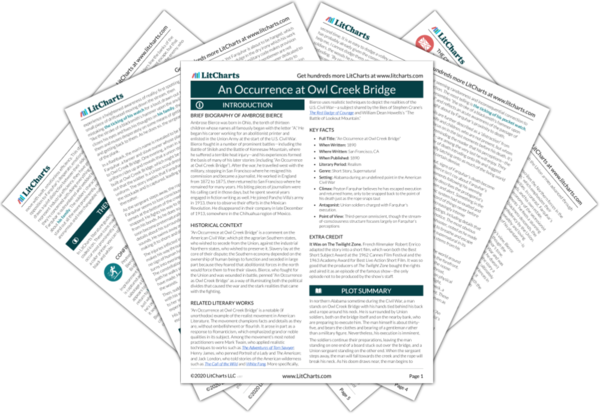Farquhar’s wife and children lie beyond the enemy lines, and as the soldiers prepare for his execution, he wonders feverishly if he might be able to escape. He thinks, “My home, thank God, is as yet outside their lines; my wife and little ones are still beyond the invader's farthest advance.” Then, miraculously, he suddenly finds himself free from the noose, and struggles madly to return to his home and family.
In one sense, the family represents hope: a kind of purity and joy that pulls Farquhar through his dark journey. This appears most prominently at the end of the story, when Farquhar believes he has returned home to find “his wife, looking fresh and cool and sweet.” The power of that emotion is enough to pull him through his feverish (and at times nightmarish) escape, and even though it ultimately proves to be just a dream, it suggests a hope worth holding onto until the last instant of life.
This is also a story set during the Civil War, and in that context the family can be seen as a stand-in for antebellum society itself. It’s the world Farquhar thinks he’s protecting, a world where families like his live peaceful and dignified lives. Bierce, who fought for the Union and was involved in abolitionist causes from an early age, understood that that lifestyle was built on the fundamentally unjust notion of slavery. Once stamped out, it couldn’t be revived. In that context, Farquhar’s family represents an outdated way of living, one that Farqhuar and those like him can never go back to. Hence, they’re pulled away from him just as he reaches them: denying their comforts to both him and the cause he died for.
Farquhar’s Family Quotes in An Occurrence at Owl Creek Bridge
He closed his eyes in order to fix his last thought upon his wife and children.

Unlock explanations and citation info for this and every other An Occurrence at Owl Creek Bridge quote.
Plus so much more...
Get LitCharts A+“My home, thank God, is as yet outside their lines; my wife and little ones are still beyond the invader's farthest advance.”
As these thoughts, which have here to be set down in words, were flashed into the doomed man's brain rather than evolved from it, the captain nodded to the sergeant.
As he pushes open the gate and passes up the wide white walk, he sees a flutter of female garments; his wife, looking fresh and cool and sweet, steps down from the veranda to meet him.
As he is about to clasp her, he feels a stunning blow upon the back of the neck; a blinding white light blazes all about him with a sound like the shock of a cannon - then all is darkness and silence!
Peyton Farquhar was dead; his body, with a broken neck, swung gently from side to side beneath the timbers of the Owl Creek bridge.












